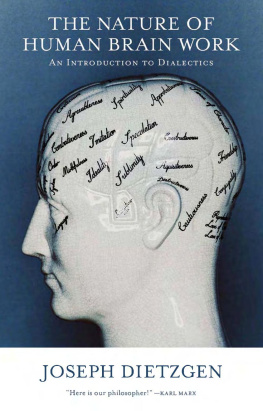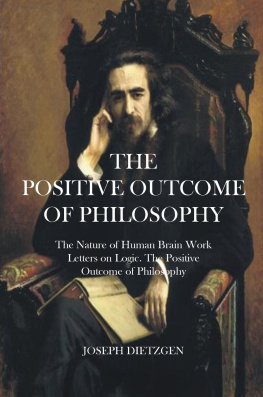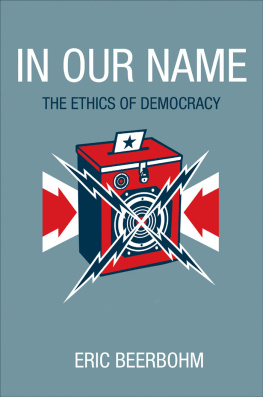Joseph Dietzgen - Ethics of Social-Democracy
Here you can read online Joseph Dietzgen - Ethics of Social-Democracy full text of the book (entire story) in english for free. Download pdf and epub, get meaning, cover and reviews about this ebook. year: 2016, genre: Science. Description of the work, (preface) as well as reviews are available. Best literature library LitArk.com created for fans of good reading and offers a wide selection of genres:
Romance novel
Science fiction
Adventure
Detective
Science
History
Home and family
Prose
Art
Politics
Computer
Non-fiction
Religion
Business
Children
Humor
Choose a favorite category and find really read worthwhile books. Enjoy immersion in the world of imagination, feel the emotions of the characters or learn something new for yourself, make an fascinating discovery.

- Book:Ethics of Social-Democracy
- Author:
- Genre:
- Year:2016
- Rating:4 / 5
- Favourites:Add to favourites
- Your mark:
- 80
- 1
- 2
- 3
- 4
- 5
Ethics of Social-Democracy: summary, description and annotation
We offer to read an annotation, description, summary or preface (depends on what the author of the book "Ethics of Social-Democracy" wrote himself). If you haven't found the necessary information about the book — write in the comments, we will try to find it.
Ethics of Social-Democracy — read online for free the complete book (whole text) full work
Below is the text of the book, divided by pages. System saving the place of the last page read, allows you to conveniently read the book "Ethics of Social-Democracy" online for free, without having to search again every time where you left off. Put a bookmark, and you can go to the page where you finished reading at any time.
Font size:
Interval:
Bookmark:

Source: Philosophical Essays by Joseph Dietzgen, published by Charles H. Kerr 1917, Edited by Eugene Dietzgen and Joseph Dietzgen Jr., translated by M. Beer and Th. Rothstein;
First Published: Volksstaat, 1875;
Transcribed: Andy Blunden.
Proofread: Andy Carloff, 2010
I
Comrades and Friends:
It is the desire of our party to realize that which the enlightened minds of all ages and nations wanted to realize: truth and justice. We do not want the truth and justice of the clergy. Ours is the material, empirical truth of applied science which we want first to know and then to practice. Impelled by the necessity of realizing a life worth living, we are interested in various kinds of truth, and especially also in that which is true justice, or in the moral world.
The world cannot exist without morality and order, not because, as the parson has it, they came from heaven, or that they were, according to professorial wisdom, prescribed by some eternal code of laws, but because they are a universal, palpable need. In one of my last sermons I have already discussed the matter how we international social-democrats are trying to systematically demonstrate all our thoughts by real or experimental facts. Let us in our present disquisition of morality apply our system and see how it works. Also the ethical law cannot lay claim to more consideration and validity than is warranted by its material basis.
The animals, apes or rabbits, have neither shame nor morality, neither fidelity nor faith. At least, their moral degree equals naught. The Caffirs have but little of it, our bourgeois class slightly more, and it is left to the socialists to teach them what is really just. In other words: morality is the result of the historic development, it is a product of evolution. It has its origin in the social instincts of the human race, in the material necessity of social life. Seeing that the ideals of social democracy are one and all directed towards a higher order of social life, they must necessarily be moral ideals.
As long as mankind has been grouped in clans, hordes, tribes, nations and states, some kind of order and laws have been necessary. But we cannot tell beforehand what those laws and institutions contain, or in other words, what conduct is to be regarded as just and equitable, for that depends on the conditions in which determinate social organization lives. The most important conditions are those of production of material goods. They decide, in the last resort, what is to be regarded as just and equitable. But inasmuch as they are not unchangeable and abiding, the laws of morality cannot be eternal. Indeed, they change with the changes in political economy. The morality and laws of hunters, shepherds, knights and bourgeois differ greatly from each other. As far as political economy is based on small private means of production, the old saying holds good:
Remember hell and you are bless'd.
Whats not your own let smartly rest!'
To-day private economy has reached its climax; the administrators of the national wealth are ardent individualists. Private property is the highest ideal; its whole mechanism, administrative and legal, constitutes the moral world. What has until now been considered as moral and just is rapidly fading away. Honesty, uprightness, integrity, family discipline, diligence and thrift are virtues of the lower middle class, of respectable peasants, artisans, tradespeople, who are trying to get some legacy and to perserve it, or to carry on their little business in the way their forefathers did. Modern capital with its new instruments of production is slowly crowding out all those classes and their moral conceptions. People who get rich in one night, or who carry on machine bakeries, have a different moral standard from those who earn an honest dollar or two a day, or who knead the dough in the sweat of their brow. We dont know to-day whether five, five and twenty, or five hundred per cent. are honest earnings or not. Our pillars of society just manage to escape penal servitude and our state attorneys are getting corrupt. The capitalist economy has a disintegrating effect upon morality and property. Our higher classes, like the Turks, buy themselves as many women as their income permits. Polygamy and the keeping of mistresses have become the custom, the ethos, and are an ethical fact. Indeed, free love is not a whit less moral than Christian monogamy. But the reason why we object to polygamy does not lie in the great variety of ones love-making, but in the venality of the women, in the degradation of the human being and in the disgraceful rule of Mammon.
Morality in human evolution is similar to matter in natural evolution: the essence is abiding, the forms are fleeting.
A great part of our lower classes, writes Treitschke, have become in matters of dress and in several other external things, more like the middle classes, but in their sense of duty and honor they are farther than ever from the educated classes. But that great part of the lower classes are not only aiming at widening the ethical gulf between themselves and the other classes, they are also at work to acquire different philosophical conceptions. The religious conception of knaves and fools is selfish enough to mistake its own interests for those of the community. The ruling classes have always and everywhere shown the disposition to consider their own selfish morality as the general ethical law and have tried to impose it as such upon the people. Socialists are not likely to be caught by such priestly snares. As far back as 1848 our Communist Manifesto declared: The ruling ideas of each age have ever been the ideas of its ruling class. Now Social-democracy rebels against all class-rule and against all ruling conceptions of duty, honor and culture. We quite admit that, despite all historical changes, there have always been officers and privates. And so will it be forever, say the officers. But the privates have their own views about that; they cannot fail to notice that in the period which has passed since the warrior chiefs, the patriarchs, Caesars and knights, to the present captains of industry, the people have become more and more self-conscious and independent; they find that there is such a thing as progressive development of history and arrive quite naturally at the reasonable conclusion to cut the rope which Treitschke, Sybel, etc., have laid down as the foundation of society. The professors are undoubtedly right in saying that domination was heretofore a necessary evil or a fact justified by reason. But also human progress towards freedom is an undeniable fact. To our rulers, however, the lesson of history does not consist in freedom, but in dominion. They are only concerned with the question whether the officers will remain forever or whether they will have to go. We social-democrats boldly assert that they will have to go overboard in order that morality may prevail. We assert, furthermore, that the revolution of the present moral world is a necessary act of true morality. Thus our views of morality differ greatly from those of the ethical braggarts.
And now I should like to explain to you, dear comrades, in words as concise as possible in what the real essence of morality consists. Guided by our dialectic-materialist conception and method, we look first, as usual in all our researches, for the material, also in this case for the ethical material, making use hereby of the terminology of every-day language. True peaches are all those which people usually call peaches. There are many kinds of them, as of morality. There it is a moral law to slaughter the enemy, to fry and eat him; here, on the contrary, the moral law commands to love the enemy and do good to him. Be a crafty rascal, says the Spartan law; sanctify property, pay the debts, commands the bourgeois. In view of such contradictions how are we to pull the sparks of truth out of the fire? Evidently by extracting the general out of the diversity, by finding what it is that has constituted the moral and just under all conditions. It cannot consist in something particular, but in the general in the abstraction of the whole moral material. To find such a rule it is therefore necessary to inquire into a sufficient quantity of moral facts; in other words, we must use the inductive method. By means of this method we find that the moral world generally consists of the considerations dictated by the social need of a given human organization. Then we find the undeniable fact that that social necessity develops with the progress of productive forces civilization, that the social instinct of man grown has that human association becomes broader and deeper, and that morality becomes more moral. Even Christian morality demands that the limited brotherly feeling of the clan, horde, nation and state shall expand into international brotherhood. But its inordinate religious spirit, its admixture of hypocrisy and foolery, prevented the ideal from being realized. It is economic materialism only, it is but the communistic re-construction of society on the basis of material work, which will bring about the true association of men. Only from the abolition of class-rule, from the transformation of the selfish capitalistic organizations into co-operative instruments of production will issue the true brotherhood of man, the true morality and justice.
Next pageFont size:
Interval:
Bookmark:
Similar books «Ethics of Social-Democracy»
Look at similar books to Ethics of Social-Democracy. We have selected literature similar in name and meaning in the hope of providing readers with more options to find new, interesting, not yet read works.
Discussion, reviews of the book Ethics of Social-Democracy and just readers' own opinions. Leave your comments, write what you think about the work, its meaning or the main characters. Specify what exactly you liked and what you didn't like, and why you think so.



